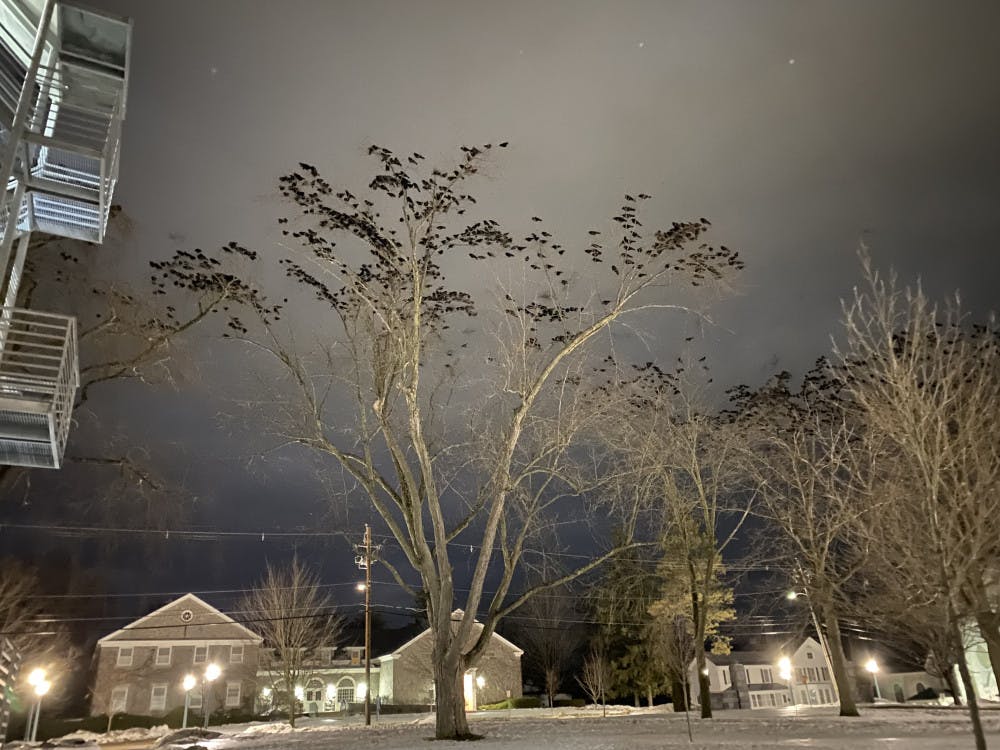The first day we were released from room quarantine this semester, I saw a dead crow half-frozen in the snow outside of Hepburn Hall. I’ll be honest, it didn’t seem like the greatest omen for the start of the semester. However, after my encounter with that one poor, unfortunate soul, I started noticing flocks and flocks of crows speckling the sky with surprising frequency: crows resting on patches of grass on the quads, taking flight at sunset, cawing and watching me ominously from the trees.
What was going on with all these crows? Was it all in my head, some sort of Hitchcock-inspired paranoia, à la “The Birds”? I had unwittingly stumbled upon a “murder” mystery of sorts.
I was determined to understand this phenomenon, so I turned to experts like local birder Bridget Butler, who delivered a lecture on the subject to the Otter Creek Audubon Society in 2019 and is known as the “Bird Diva.”
The huge group of crows I was seeing were part of a winter roost, according to Butler. In the winter months in particular, flocking and roosting in large groups provides protection from predators and the ability to find good food sources by following other birds. Roosting together in large numbers also conserves body heat.
“When you roost together, there’s body heat,” Butler said in an interview with The Campus. “Some scientists are using infrared cameras to look at what the core temperature is of the roost at night... it is warmer.”
Still, this doesn’t explain why they’ve chosen Vermont — or Middlebury in particular — of all places. Oliver Patrick ’24, an avid birder, has a few potential ideas.
“I can say [they’re] probably in the Champlain Valley… because of the agricultural region. Crows are open field birds. They’ll look for big fields,” Patrick said. As for why Middlebury in particular, the cause seems less clear. “Maybe it’s all the juju from students struggling with exams,” he joked.
Although crows have been roosting in several spots across the state, they favor the spots with artificial light in more urban areas — locations that their predators tend to avoid. In past years, this has included locations such as the green in front of the Middlebury Inn, Chipman Hill and even across the road from the home of Ron Payne, the president of the Otter Creek Audubon Society.
This year, though, some of the crows’ favorite roosting spots have been on the college campus itself. This explains why I was suddenly very aware of their evening roost, but why the shift in location? Payne offers a potential explanation.
“You all haven't been around for most of the winter,” Payn said. “The campus has always been a [well-lit] place with lots of trees to roost in, but without students out and about at all times of the night, it must have seemed a much more inviting place.”
For those curious about the geographic distribution of crows across Vermont, Butler’s online project — aptly titled “Crows in Vermont” — offers the opportunity to join a larger community of crow enthusiasts.
“It’s a true community science project,” Butler said. The project allows birders to report flocks large and small to start answering the question of where the crows inhabit.
Estimating the numbers of massive flocks is an acquired skill; birders count by group rather than individually, depending on how large the flock is.
“It’s really quite miraculous,” Butler said. “It’s kind of overwhelming, cacophonous — lots of noise and chatter with the birds — and when dark falls, when you really get past that inky blue-black sky...they go silent.”
Those interested in seeing the crows for themselves should catch them while they can: The large flocks will start to disperse again later in spring.

Olivia Mueller '24 (she/her) is a News Editor.
Previously an Arts and Culture editor, Olivia is an International Politics and Economics major with a Spanish minor. Outside of the Campus, she is a spin instructor for YouPower, an avid runner and hiker, and a member of the Middlebury Mischords a cappella group.




